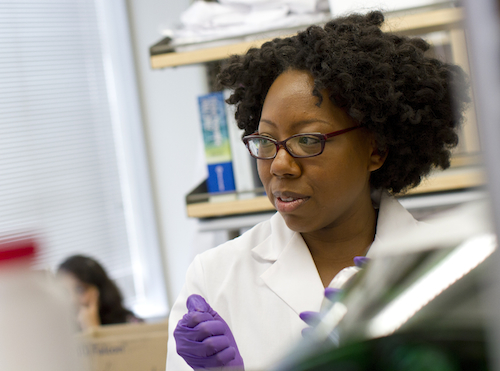User:Karmella Haynes
Contact Info

Karmella A. Haynes
Arizona State University
School of Biological and Health Systems Engineering
501 E Tyler Mall
ECG 346, Box 9709
Tempe, AZ 85287
phone: 480-965-4636
fax: 480-727-7624
karmella.haynes at asu dot edu
Positions
- 2011, Assistant Professor, School of Biological and Health Systems Engineering, Arizona State University
Education
- 2008 - 2011, NIH NRSA Postdoctoral research fellow in Synthetic Biology, Harvard Medical School
- 2006 - 2008, HHMI Postdoctoral research/ teaching fellow in Synthetic Biology, Davidson College
- 2006, Ph.D. in Molecular Genetics, Washington University in St. Louis
- 1999, B.S. in Biology, Florida A&M University
Links
Lab Links
Haynes Lab OpenWetWare Site
Haynes Lab at Arizona State University
Openwetware Lab Notebook
Course Links
Molecular Synthetic Biology Project Template
iGEM Teams
Harvard 2010 iGEM Team Wiki
Harvard 2010 iGEM Blog
ASU 2011 iGEM Team Wiki
Synthetic Biology Organizations
Genome Consortium For Active Teaching
Research interests
Synthetic Biology
The field of synthetic biology aims to engineer tiny machines, fashioned from characterized DNA and protein components, that perform useful functions, like synthesizing useful metabolites, attacking tumors, and detecting compounds in the environment. My research lab explores the use of eukaryotic proteins as modular parts for building rationally designed devices in living cells.
Chromatin, An Untapped Resource for Parts
Nature provides an abundant source of functional proteins for designing new systems. To date, chromatin proteins are an untapped resource. A class of chromatin proteins, known as "effectors," have the remarkable ability to discriminate and bind to specific post-translational modifications of target proteins called histones. Can a synthetic protein device be engineered to read histone modifications? Can we use this type of device as a new tool to monitor changes in histone modifications in single living cells? Accomplishing these goals will allow scientists to probe histone modification at unprecedented resolution, thus furthering our understanding of the dynamics of histone modifications associated with cancer and normal cell development.
Publicity
Calculating Bacteria: Real Computer Bugs?
National Public Radio, Science Friday with Ira Flatow
A group of scientists reports in the Journal of Biological Engineering that they have created specially modified E. coli bacteria capable of performing one specific type of calculation — a puzzle known as the "pancake flipping problem." Karmella Haynes, one of the researchers, discusses the prospects for biologically based computing, and ways in which calculating bacteria might be useful.
Synthetic Biologist Karmella Haynes
WBUR Teacher's Domain
This video produced for Teachers' Domain profiles Karmella Haynes, a post-doctoral researcher working in the emerging field of synthetic biology. Karmella explains how she uses biotechnology to build living machines, or devices, from genes.
Publications
Research
- Synthetic reversal of epigenetic silencing
Haynes KA, Silver PA. (2011) J Chem Biol. E-pub ahead of print. PMID: 21669865
Cover article - Engineering bacteria to solve the burnt pancake problem
Haynes KA, Broderick ML, Brown AD, Butner TL, Dickson JO, Harden WL, Heard LH, Jessen EL, Malloy KJ, Ogden BJ, Rosemond S, Simpson S, Zwack E, Campbell AM, Eckdahl TT, Heyer LJ, Poet JL. (2008) J Biol Eng. PMID: 18492232
JBE Publication of the Year, 2008 - An investigation of heterochromatin domains on the fourth chromosome of Drosophila melanogaster
Riddle N, Leung W, Haynes KA, Granok H, Wuller J, Elgin SC. (2008) Genetics. PMID: 18245350 - A distinct type of heterochromatin within Drosophila melanogaster chromosome four
Haynes KA, Gracheva E, Elgin SC. (2006) Genetics. PMID: 17194780 - Element 1360 and RNAi components contribute to HP1-dependent silencing of a pericentric reporter
Haynes KA, Caudy AA, Collins L, Elgin SC. (2006) Current Biol. PMID: 17113386 - cis-Acting determinants of heterochromatin formation on Drosophila melanogaster chromosome four
Sun FL, Haynes K, Simpson CL, Lee SD, Collins L, Wuller J, Eissenberg JC, Elgin SC. (2004) Mol Cell Biol. PMID: 15340080
Reviews
- Eukaryotic systems broaden the scope of synthetic biology
Haynes KA, Silver PA. (2009) J Cell Biol. PMID: 19948487 - Analyzing heterochromatin formation using chromosome 4 of Drosophila melanogaster
Haynes KA, Leibovitch BA, Rangwala SH, Craig C, Elgin SC. (2004) CSHSQB. PMID: 16117658
Science Art Gallery
In addition to science research, I paint and draw. Below are pieces that have a scientific theme. You can view my other work at http://www.karmellahaynes.com
-
Tessellation of Drosophila Heads, 2006
-
"Metastasis" cells invading a paint pallette, 2005

